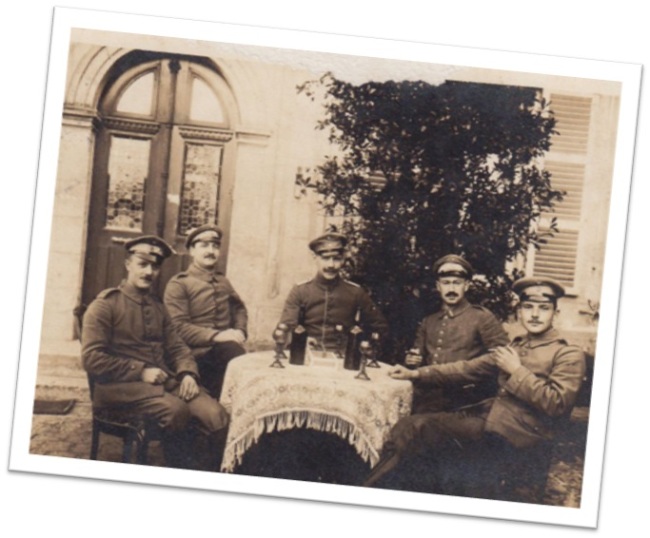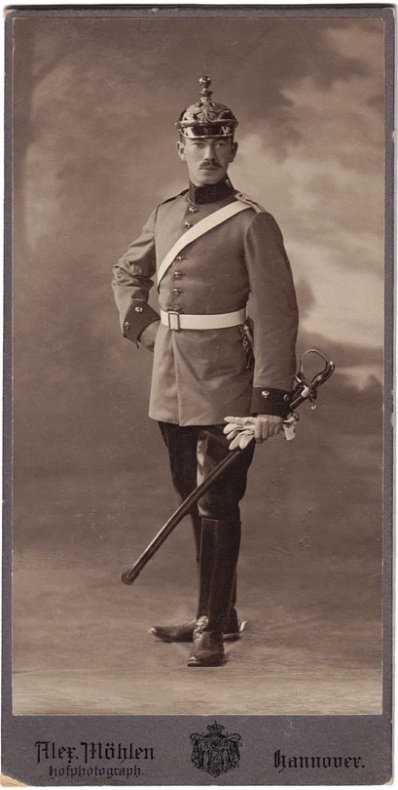Julius & Max Weinberg: One rainy November day last year, we had the delight of interviewing almost twenty people and digitizing scores and scores of sentimentally fortified objects. It was a COTGW highlight made possible by our friends at the Jewish Military Museum who co-hosted Children of The Great War at the suitably atmospheric RAF Museum Hendon. In the first German account of WWI to enter this archive, it is with thanks to Mr. Kurt Weinberg who generously shared his father and uncle’s story with us:
“He was born in a small village in North West Germany called Werther, halfway between Hannover and Cologne. I have here a picture of the house where he was born [shows picture]. This little cottage doesn’t stand there anymore now but I have been back there many times and I used to go there as a schoolboy. It’s in the main street number 44 …..strasse?, which is the main street in the little village, which at that time had about 2,500 inhabitants
“My father was a cigar manufacturer, which his grandfather started in 1877. I have got a picture here of the letter heading…. My father had a twin brother Max – Maximillian, and that’s my grandmother and she had twins, twin boys.
We asked Kurt in he knew how his father become involved in the First World War; did he volunteer? Was he conscripted?
“I’ve got a document here. In 1908 he passed sufficient school examinations to be accepted as a volunteer for one year in the German Army. When the First World War started in 1914 he was called up and this is my Uncle, my father’s twin brother in uniform, he was an officer but my father was not an officer. My father was a Sergeant.”
We asked if Uncle Max was in a combat unit. The answer, a firm:
“Yes he used to show me – he has shot wounds in his arm.”
Julius also shared with his son the stories and physical reminders of his time in the supply corps
“He did tell me one story that the big horse stamped on his foot and he didn’t like it a bit. I have a photograph of my father and his colleagues’ playing cards. The most valuable and interesting piece of paper I have got is this here. It is called in German Soldbuch, (service record). It is record of what you were doing. It is his book, that’s a genuine article called Soldbuch. It mentions what happened [at the time] and how much he was paid. Of course it is all in German. I may have to get the help of someone whose German is better than mine to translate it exactly for me. My grandfather’s signature is also in here. It’s a fascinating book dating back to 1908 and then in 1914. Here we have Kitchener ‘Your Army Needs You’ ,and there it was the Jewish German people were to fight for the Kaiser…”
Kurt showed us other medals and chronicles from the life of the men who were once soldiers on the front:
“One is that he served in War and the second one is that he was at a certain battle in France (the Rhine Medal) and I have official documents from the German archive. When the Nazi’s came to power in 1933 my father obviously felt it important to let the German authorities know that he was fighting for Germany so he thought he was safe. His cousin who lived in the same village in Germany he was not an officer in the army. The cousin joined what is the equivalent here of the AJEX* organisation here – there was also in Germany an organisation for Jewish Men Fighting for the Kaiser against France. My father didn’t belong to that organisation. But his cousin did and that whole family got murdered by the Nazis. There was one boy who was 2 weeks older than I. I was born in 1924 July 23 and my cousin was born on 7 July 1924…..”
“….So what my father did in 1933: Hitler came to power in January 1933 and my father got a letter from the army archives in Germany to say that he became a volunteer in 1908, that he passed sufficient examinations, that where he fought in France…. So he got those documents but they didn’t help. They sent him to Buchenwald later on.”
…..But he survived Buchenwald….
“Yes, my mother managed to get the papers that he could emigrate.”
We posed the following question to Mr. Weinberg: When you were a child do you think he had any reaction to the First World War? Did it change his life as a human being, because the experience of the Jewish German is such a different experience? His answer was matter-of-fact and sobering;
“Did it change his personality? You see when you were living in a village like Werther you were physically active. Everybody had their little plot of land. I don’t think there was a greengrocer in the village. My grandfather bought the most prestigious property in the village and transferred the cigar factory to that. When the Nazis took the factory away from him he employed as many as 300 people. He was a major employer in this village. So my father was used to physical work and so the army was physical especially if you had a horse pulling a cart….”
*(AJEX refers to our the Association of Jewish Ex-Servicemen & Women http://www.ajex.org.uk/ )



Very interesting – can anyone provide Julius’ dates of birth and death?
Dear Agnes,
Thanks for your question. If you are interested in researching the lives we’re chronicling as part of this project, you’ll probably benefit from our page in partnership with Europeana, links to appear soon on the Children of The Great War website which will be launched this year. in the meantime, like our facebook page https://www.facebook.com/childrenofthegreatwar for updates.
best wishes,
COTGW
THANK YOU BUT I am completing a book in the next week or so and I wanted Julius’ dates – can anyone provide them now?